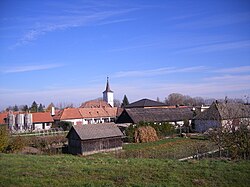Sap, Slovakia
Sap
Szap | |
|---|---|
village | |
 The view of the village from the Danube | |
| Coordinates: 47°49′13″N 17°37′08″E / 47.82028°N 17.61889°E | |
| Country | |
| Region | Trnava |
| District | Dunajská Streda |
| First written mention | 1255 |
| Government | |
| • Mayor | Imre Bartal (Party of the Hungarian Coalition) |
| Area | |
• Total | 12.43[4] km2 (4.80[4] sq mi) |
| Elevation | 113[5] m (371[5] ft) |
| Population (2021)[6] | |
• Total | 503[1] |
• Estimate (2008) | 550 |
| Ethnicity | |
| • Hungarians | 96,30 % |
| • Slovaks | 2,41 % |
| Time zone | UTC+1 (EET) |
| • Summer (DST) | UTC+2 (EEST) |
| Postal Code | 930 06[5] |
| Area code | +421 31[5] |
Sap (Hungarian: Szap, pronounced [ˈsɒp]) is a village and municipality in the Dunajská Streda District in the Trnava Region of south-west Slovakia. The outlet channel of the Gabčíkovo – Nagymaros Dams re-enters the Danube at the village.
History
[edit]The village was first recorded in 1255 as Zap. Until the end of World War I, it was part of Hungary and fell within the Tószigetcsilizköz district of Győr County. After the Austro-Hungarian army disintegrated in November 1918, Czechoslovak troops occupied the area. After the Treaty of Trianon of 1920, the village became officially part of Czechoslovakia. In November 1938, the First Vienna Award granted the area to Hungary and it was held by Hungary until 1945. After Soviet occupation in 1945, Czechoslovak administration returned and the village became officially part of Czechoslovakia in 1947. In 1948, Czechoslovak authorities renamed the village for Palkovičovo and its historical name was restored only in 1990.
Demography
[edit]In 1910, the village had 645, for the most part, Hungarian inhabitants. At the 2001 Census the recorded population of the village was 540 while an end-2008 estimate by the Statistical Office had the villages's population as 550. As of 2001, 96,30 per cent of its population was Hungarian while 2,41 per cent was Slovak.
As of 2001, 58,52% of the inhabitants professed Roman Catholicism.[6]
References
[edit]- ^ "Počet obyvateľov podľa pohlavia - obce (ročne)". www.statistics.sk (in Slovak). Statistical Office of the Slovak Republic. 2022-03-31. Retrieved 2022-03-31.
- ^ Local election results by the Statistical Office of the Slovak Republic, December 2006 Archived 2011-08-11 at the Wayback Machine
- ^ Local election 2010 results by the Statistical Office of the Slovak Republic Archived 2011-08-11 at the Wayback Machine
- ^ a b "Hustota obyvateľstva - obce [om7014rr_ukaz: Rozloha (Štvorcový meter)]". www.statistics.sk (in Slovak). Statistical Office of the Slovak Republic. 2022-03-31. Retrieved 2022-03-31.
- ^ a b c d "Základná charakteristika". www.statistics.sk (in Slovak). Statistical Office of the Slovak Republic. 2015-04-17. Retrieved 2022-03-31.
- ^ a b c "Urban and Municipal Statistics MOŠ". Archived from the original on 2011-02-26.
- ^ a b "Hustota obyvateľstva - obce". www.statistics.sk (in Slovak). Statistical Office of the Slovak Republic. 2022-03-31. Retrieved 2022-03-31.

